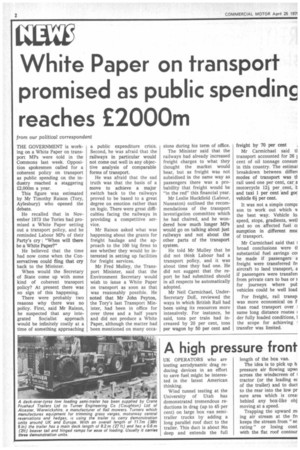White Paper on transport promised as public spending reaches £2000m
Page 4

If you've noticed an error in this article please click here to report it so we can fix it.
from our political correspondent THE GOVERNMENT is working on a White Paper on transport MPs were told in the Commons last week. Opposition spokesmen called for a coherent policy on transport as public spending on the industry reached a staggering £2,000m a year.
This figure was estimated by Mr Timothy Raison (Tory, Aylesbury) who opened the debate.
He recalled that in November 1973 the Tories had promised a White Paper setting out a transport policy, and he reminded Labour MPs of their Party's cry : "When will there be a White Paper?"
He believed that the time had now come when the Conservatives could fling that cry back to the Minister.
When would the Secretary of State come up with some kind of coherent transport policy? At present there was no sign of this happening.
There were probably two reasons why there was no policy. First, said Mr Raison, he suspected that any integrated Socialist approach would be infinitely costly at a time of something approaching a public expenditure crisis. Second, he was afraid that the railways in particular would not come out well in any objective analysis of comparable forms of transport.
He was afraid that the sad truth was that the basis of a move to achieve a major switch back to the railways proved to be based to a great degree on emotion rather than on logic. There were great difficulties facing the railways in providing a competitive service.
Mr Raison asked what was happening about the grants for freight haulage and the approach to the 100 big firms to see whether they would be interested in setting up facilities for freight services.
Mr Fred Mulley, the Transport Minister, said that the Environment Secretary would wish to issue a White Paper on transport as soon as that was reasonably possible. He noted that Mr John Peyton, the Tory's last Transport Minister, had been in office for over three and a half years and did not produce a White Paper, although the matter had been mentioned on many occa sions during his term of office.
The Minister said that the railways had already increased freight charges to what they thought the market would bear, but as freight was not subsidised in the same way as passengers there was a probability that freight would be "in the red" this financial year.
Mr Leslie Huckfield (Labour, Nuneaton) outlined the recommendations of the transport investigation committee which he had chaired, and he wondered how much longer MPs would go on talking about just railways and not about the other parts of the transport system.
He told Mr Mulley that he did not think Labour had a transport policy, and it was about time they had one. He did not suggest that the report he had submitted should in all respects be automatically adopted.
Mr Neil Carmichael, UnderSecretary DoE, reviewed the ways in which British Rail had been using its resources more intensively. For instance, he said, tons per train had increased by 20 per cent, tons per wagon by 50 per cent and
freight by 70 per cent
Mr Carmichael said tl transport accounted for 26 j cent of oil tonnage consurr in this country. The estimat breakdown between differ( modes of transport was tl rail used one per cent, car a motorcycle 12 per cent, h and taxi 1 per cent and goc vehicle 6i per cent.
It was not a simple compa. son to work out which the best way. Vehicle lo speed, stops, gradients, wet] and so on affected fuel ci sumption in different moc of transport.
Mr Carmichael said that I broad conclusions were tl substantial fuel savings coi be made if passengers a freight were transferred fn aircraft to land transport, a if passengers were transfen from private cars to bus or for journeys where put vehicles could be well load For freight, rail transp was more economical on f than road transport over same long distance routes der fully loaded conditions, I the scope for achieving transfer was limited.




















































































